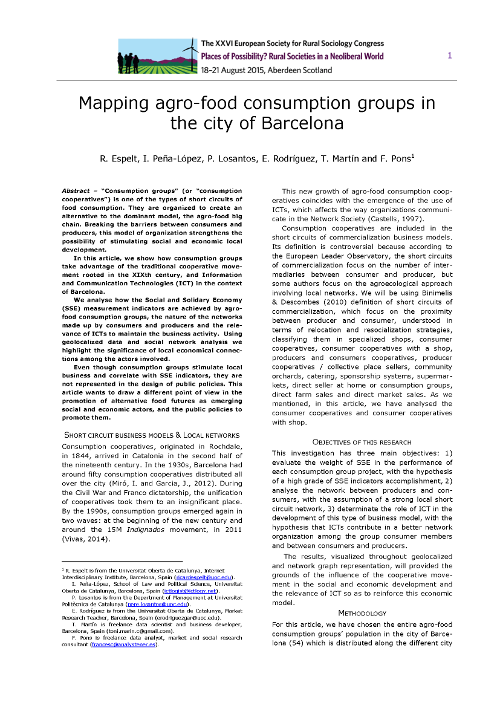
My colleague Ricard Espelt is these days at the XXVI European Society for Rural Sociology Congress, in Aberdeen, Scotland. The motto of this year’s edition of the congress is Places of possibility? Rural societies in a neoliberal world
and this is just what Ricard is presenting on behalf of a small team he put up to analyse and map agro-food consumption groups in the city of Barcelona.
The communication he just presented, Mapping agro-food consumption groups in the city of Barcelona, is but a part of a major research project that Ricard is doing and that I have the luck to be a part of. Following can be found the abstract, slides and downloads of our communication, signed together by Ricard Espelt, Pere Losantos, Enrique Rodríguez, Toni Martín, Francesc Pons and myself. Mind that it is only a short paper and, thus, only a small part of the information produced is available. Comments (and/or requests) will definitely be welcome.
Abstract
“Consumption groups” (or “consumption cooperatives”) is one of the types of short circuits of food consumption. They are organized to create an alternative to the dominant model, the agro-food big chain. Breaking the barriers between consumers and producers, this model of organization strengthens the possibility of stimulating social and economic local development.
In this article, we show how consumption groups take advantage of the traditional cooperative move-ment rooted in the XIXth century, and Information and Communication Technologies (ICT) in the context of Barcelona.
We analyse how the Social and Solidary Economy (SSE) measurement indicators are achieved by agro-food consumption groups, the nature of the networks made up by consumers and producers and the rele-vance of ICTs to maintain the business activity. Using geolocalized data and social network analysis we highlight the significance of local economical connec-tions among the actors involved.
Even though consumption groups stimulate local business and correlate with SSE indicators, they are not represented in the design of public policies. This article wants to draw a different point of view in the promotion of alternative food futures as emerging social and economic actors, and the public policies to promote them.
Slides
Dowloads
Espelt, R., Peña-López, I., Losantos, P., Rodríguez, E., Martín, T. & Pons, F. (2015). “Mapping agro-food consumption groups in the city of Barcelona”. In Places of possibility? Rural societies in a neoliberal world. Proceedings of the XXVI ESRS Congress, Aberdeen, Scotland, 2015. Aberdeen: The James Hutton Institute
Espelt, R., Peña-López, I., Losantos, P., Rodríguez, E., Martín, T. & Pons, F. (2015). “Mapping agro-food consumption groups in the city of Barcelona”. In Places of possibility? Rural societies in a neoliberal world. Proceedings of the XXVI ESRS Congress, Aberdeen, Scotland, 2015. Aberdeen: The James Hutton Institute
If you need to cite this article in a formal way (i.e. for bibliographical purposes) I dare suggest:
Peña-López, I. (2015) “Communication. Mapping agro-food consumption groups in the city of Barcelona” In ICTlogy,
#143, August 2015. Barcelona: ICTlogy.
Retrieved month dd, yyyy from
https://ictlogy.net/review/?p=4351
Previous post: Emancipation and the failure of the Sustainable Development Goals
Next post: Detaching learning from educational institutions
1 Comment to “Communication. Mapping agro-food consumption groups in the city of Barcelona” »
 RSS feed for comments on this post.
TrackBack URI
RSS feed for comments on this post.
TrackBack URI


Pingback: Mapping agro-food consumption groups in the city of Barcelona | Ricard Espelt